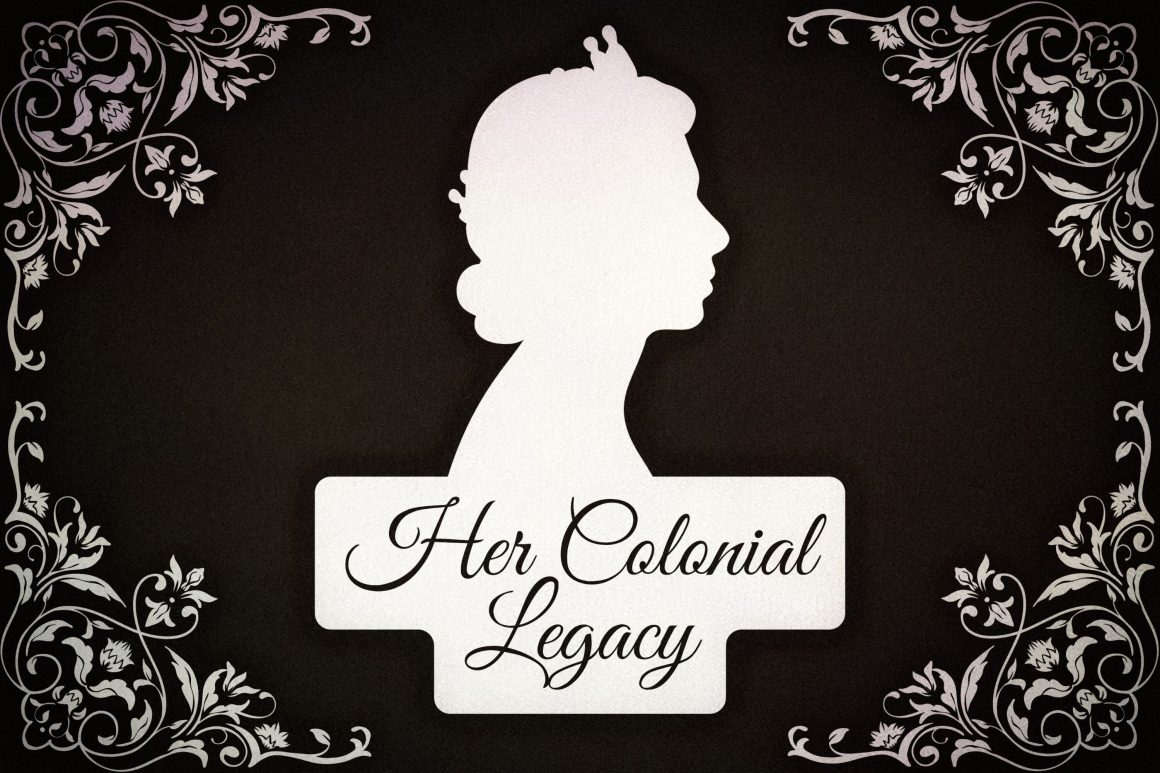
Queen Elizabeth II has passed at 96 — let’s review her active participation in colonial oppression
By Aymen Sherwani, September 29 2022—
Everyone knows where they were when news broke that the Queen of the United Kingdom and Commonwealth passed on Sept. 8, 2022 — whether or not you’re a supporter of the British monarchy, the news sent indiscriminate shockwaves to everyone across the world, with reactions to her death being mixed. To some, Queen Elizabeth was the young girl who had the monarchy thrust upon her and — despite this — has left behind a legacy as a sweet grandmother-figure who has tea parties and marmalade sandwiches with Paddington Bear. Her 70-year reign, to them, was a glittering transition from the old world to one of technological innovation and political progress and her passing causing insurmountable levels of grief to those who mourn her.
Others around the world, instead, mourn the pain and trauma caused by the British royal family, viewing Elizabeth II’s reign as a period of apathetic detachment from the political turmoil arising from synthetic racial hierarchies — created and left behind in post-colonial nations, like Canada, India and Kenya, where the cultural impacts of these policies are still felt today. These are nations that still demand that the UK return stolen artifacts that are tastelessly displayed by the British Museum and priceless jewels — the bulk of which encompass the royal family’s jewelry collection — the largest of which are India’s Koh-i-Noor diamond and the Great Star of Africa. Yes, Elizabeth II did not start Britain’s notoriety for colonialism, with monarchists claiming that her reign actually ended such a convention, but she was by no means a liberator.
The royal family’s hunting traditions have disrupted ecosystems in the colonial world — with now-endangered tigers and water buffalos being shot, stuffed and hung in their private collection. Residential schools thrived in Canada well into her reign and sanctioned by the Church of England — of which she was the silent and complicit figurehead. In 1999, she used her veto power to strike down a bill against military action that supported the US-led invasion of Iraq — a region that continues to be destabilized by the events that have unfolded since then.
When it comes to circumstances that are closer to her domestic domain, Britain tries very hard to rebrand the Queen as the sweet and witty grandmother overseeing the UK — one would question whether it is to detract from the royal family’s excess at a time when more than one in five people are living in poverty, rely on food banks and go to bed with their coats on because they cannot afford to pay electricity. The Queen’s funeral alone cost around $9 million CAD, while she has spent taxes to fund a life that is one far-removed from the lives of the everyday Britain. As a representative of the people, her dedication to being apolitical — while wise within political gray zones — has been a quick cop out during times where neutrality can be seen as inherently oppressive.
In understanding this — people around the world have a right to have complicated emotions and should not be policed for refusing to mourn the death of a figurehead that is representative of a very distinct and inter-generational manifestation of sorrow. They have the right to feel a certain degree of happiness and relief. As a Pakistani-Canadian woman — I don’t know how to feel. My family has had a very close and multi-generational relationship with British colonialism. My great-grandparents had no choice but to fight for the British Empire in both World War I and II, my grandparents worked under — but never above — British officers throughout their lives leading up to the Partition of 1947 and even my parents had British school teachers growing up who indoctrinated them into believing that speaking their ancestral languages was inferior to English-language proficiency.
Living in Canada for my entire life — another realm in the British periphery — and seeing the Queen’s face on our currency, while knowing this nation is another bloodstained legacy of the crown’s greed, feels unsettling. As the National Truth and Reconciliation Day in Canada approaches, recognizing the horrors of the residential school system, Indigenous communities question whether a mandatory moment of silence to mourn the late monarch is in good taste. At this time, I am not mourning the death of the Queen — I am mourning the people affected by her.
This article is a part of our Voices section.
